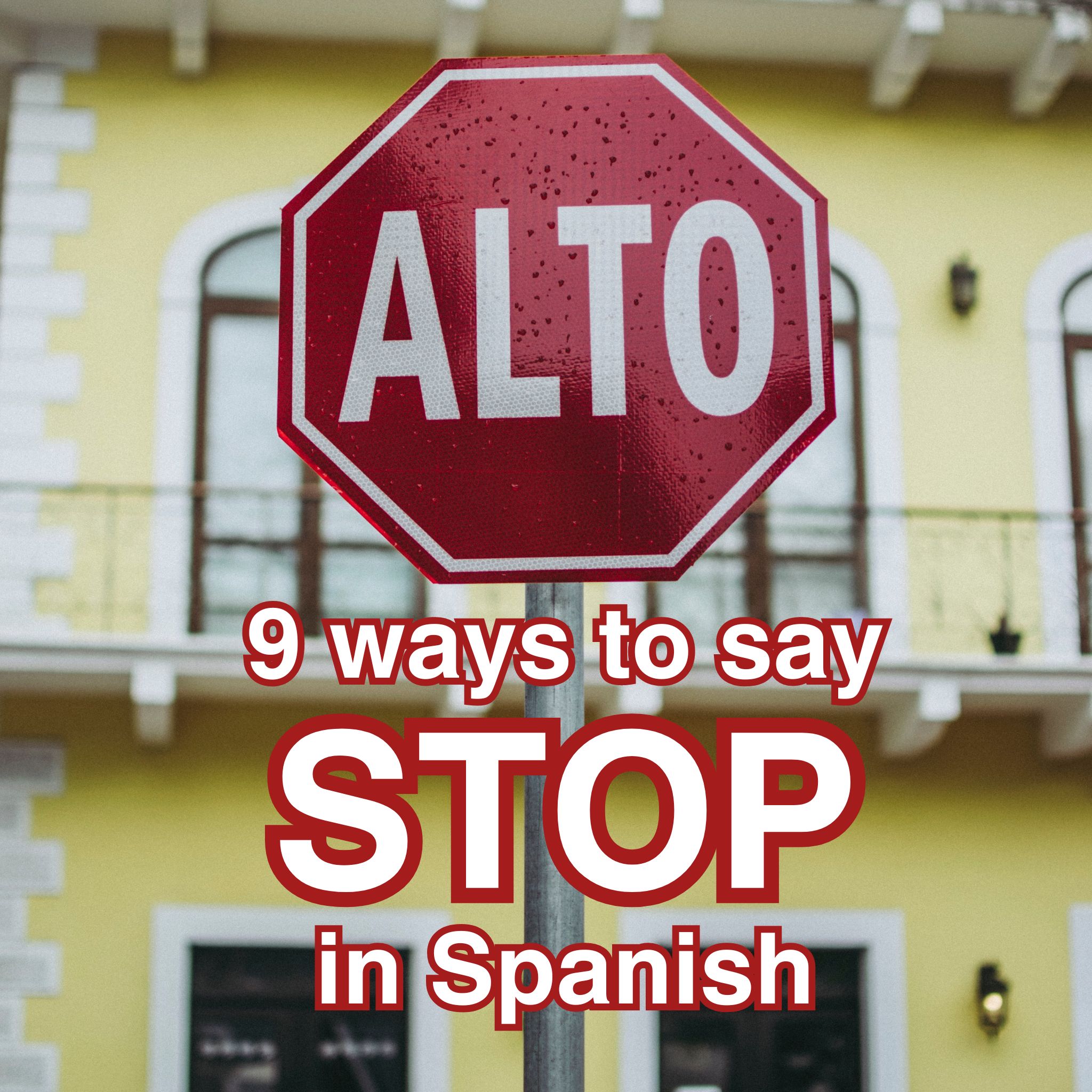Stop in Spanish: 9 different ways to say Stop

Get our free email course, Shortcut to Conversational.
Have conversations faster, understand people when they speak fast, and other tested tips to learn faster.
More infoStop right there! Do you think you already know how to say stop in Spanish? In fact, there are multiple Spanish words for stop, depending on whether it’s being used as an interjection, as a verb, or within a bigger phrase. Yes, there’s a stop in Spanish for every occasion!
With this in mind, today we’ll explore 9 different ways to say stop in Spanish! We’ll look at the context for using each one, along with their various nuances. As always, we’ll provide plenty of examples to make sure everything is understood.
Don’t stop now, we’re just getting started!
Alto – Halt
Alto is one of the most straightforward and commonly used ways to say stop in Spanish. It can be used as an interjection to command stop, or as a masculine noun. In some Spanish countries, stop signs at intersections even say alto.
Although the spelling is identical, alto in this sense has nothing to do with the Spanish adjective for tall. We can tell the difference by context: when used as an adjective, alto is always used to describe a noun as being tall, whereas as an interjection it always stands on its own to command a halt.
- ¡Alto, ciudadano! Esta área es restringida. – Halt, citizen! This area is restricted.
- Ten más cuidado, te pasaste la señal de «alto». – Be more careful, you ran the stop sign.
- ¡Alto en nombre de la ley! – Stop in the name of the law!
- Tenemos que ponerle un alto a su mala actitud. – We have to put a stop to his bad attitude.
- ¡Alto al fuego! – Stop the fire!
Basta – Enough
Now that we’ve covered the formal interjection for commanding someone to stop, let’s get into the informal options. Although the interjection ¡basta! doesn’t translate directly as stop in Spanish, it has a very pragmatic use to convey a sense of urgency for something to cease.
When we exclaim ¡basta! in a situation, we’re essentially demanding that a particular action, behavior, or situation be put to an immediate end. It can be used on its own or with the preposition de along with a complement.
- ¡Basta, ya no quiero hablar más de esto! – Enough already! I don’t want to talk about this anymore!
- ¡Basta de excusas, ya no te creo nada! – Enough with the excuses, I don’t believe you anymore!
- ¡Ya basta! ¡Se acabó! – That’s enough! It’s over!
- Basta de gritos, por favor. – Enough with the yelling, please.
Suficiente – Enough
Just like the preceding expression, suficiente doesn’t have a direct translation as to stop in Spanish. The meaning of the adverb suficiente in Spanish is closer to sufficient or enough. We include it in our list of ways to say stop in Spanish because of its effective use as an interjection for conveying the desire for the ongoing action or situation to be stopped.
- ¡Suficiente, niños! Si siguen discutiendo, no habrá postre para ninguno. – That’s enough, children! If you keep arguing, there will be no dessert for anyone.
- ¡Suficiente! Ahora es mi turno de hablar. – Enough! It’s my turn to speak now.
- ¡Suficiente, cariño! Deja de llorar y explícame qué quieres. – Enough, dear! Stop crying and tell me what you want.
Parar, Parar de – To stop
Parar is a versatile verb in Spanish that translates as to stop. It can be applied in various contexts, signifying the cessation of an action, a movement, a process, or an object.
When used without a preposition, parar takes a noun as a complement to indicate what is stopping. Remember that where the noun is a person, we need to use the personal a between parar and the person.
Parar follows the regular conjugation patterns of Spanish -ar verbs.
- ¡Para a esa mujer, se llevó mi bolso! – Stop that woman, she took my purse!
- No pares la película, por favor. – Don’t stop the film, please.
- ¡Paren la música en este instante! ¡Párenla! – Stop the music this instant! Stop it!
- Su belleza es capaz de parar el tráfico. – Her beauty is capable of stopping traffic.
- Él para la máquina usando una palanca. – He stops the machine using a lever.
- El cantante paró el concierto un momento por problemas de sonido. – The singer stopped the concert for a moment because of sound problems.
When talking about the stopping of an action, we always use the preposition de with parar, followed by the action verb in infinitive. In some cases where the context is clear, parar can still be used on its own while omitting the action verb.
- ¿Sigue lloviendo? ¡No, ya paró [de llover]! Salgamos a jugar. – Is it still raining? No, it stopped [raining]! Let’s go out and play.
- ¡Para de gritar! ¡Vas a despertar a los vecinos! – Stop yelling! You’ll wake up the neighbors!
- No pares de correr hasta que al menos completes una vuelta entera. – Don’t stop running until you at least complete a whole lap.
- Ella es adicta al trabajo, nunca para [de trabajar]. – She’s a workaholic, she never stops [working].
- Si paras ahora, nunca aprenderás a tocar el piano. – If you stop now, you’ll never learn to play the piano.
Dejar de – To stop
Dejar in Spanish is usually translated as to leave, to let, or to allow, depending on the context. However, when used with the preposition de, the phrase dejar de functions as a way to say stop in Spanish. It works in the same way as parar de, meaning that it’s followed by an infinitive verb.
Dejar de is particularly useful when giving commands, when we tell people to stop doing something. We saw this verb in one of our expressions for saying shut up in Spanish: deja de hablar.
Dejar follows the regular conjugation pattern for -ar verbs.
- Deja de hablar con la boca llena, Luis. Es de mala educación. – Stop talking with your mouth full, Luis. It’s rude.
- Si no deja de sacar el teléfono en clase, tendré que quitárselo. – If you don’t stop taking out your phone in class, I’ll have to take it away.
- No dejo de pensar en ese perrito que vimos ayer. – I can’t stop thinking about that little dog we saw yesterday.
- Ojalá Ana dejara de juntarse con esos chicos tan groseros. – I wish Ana would stop hanging out with those rude boys.
- No dejes de creer en tus sueños. – Don’t stop believing in your dreams.
Detener – To stop
Detener is another verb commonly used to indicate the act of stopping. It is often employed in formal or legal contexts. Unlike the previous verbs which can be used with de and another verb to talk about stopping another action, detener can only be used with nouns or on its own in the command form.
Detener follows the same conjugation pattern as the Spanish verb tener.
- ¡Detén el auto ahora! – Stop the car now!
- ¡Sigue cantando, no te detengas! Tienes una voz hermosa. – Keep singing, don’t stop! You have a beautiful voice.
- Tenemos que detener el programa antes de que cause más daño. – We have to stop the software before it causes more damage.
- La policía detuvo el tráfico para permitir el paso de la ambulancia. – The police stopped traffic to allow the ambulance to pass.
- La empresa decidió detener la producción temporalmente debido a problemas con los suministros. – The company decided to stop production temporarily due to problems with supplies.
Suspender – To stop, To suspend
Like its English counterpart, suspender in Spanish is used to indicate that some activity that’s normally ongoing is being stopped, whether temporarily or indefinitely. Suspender is often used in official notices to inform citizens that a service is suspended; it is not usually given as an order.
Suspender is conjugated like any regular -er verb in Spanish.
- La ciudad suspende el riego hasta que comience la temporada de lluvias. – The city is suspending irrigation until the rainy season begins.
- El doctor recomienda suspender el tratamiento. – The doctor recommends stopping treatment.
- La aerolínea suspende el servicio durante el huracán. – The airline is putting its service on hold during the hurricane.
- Los pagos se suspenden durante la investigación. – Payments are on hold during the investigation.
Cesar – To cease
Cesar serves as a formal way to express to stop or to cease in Spanish. It is frequently found in written and official documents. Cesar isn’t regularly used as a command, but it can still be employed to give orders with some sense of gravity.
Cesar follows the regular conjugation pattern of -ar verbs.
- La fábrica cesó sus operaciones durante la huelga de los trabajadores. – The factory ceased operations during the workers’ strike.
- La empresa se vio obligada a cesar los pagos debido a dificultades financieras. – The company was forced to cease payments due to financial difficulties.
- La fiscalía va a cesar la investigación por falta de pruebas. – The prosecutor’s office is going to cease the investigation due to lack of evidence.
- Si no cesa el conflicto, no podremos prosperar. – If the conflict does not cease, we will not be able to prosper.
- ¡Cese el ruido inmediatamente o será sancionado! – Cease the noise immediately or you will be sanctioned!
Impedir – To prevent, To stop, To impede
Impedir is used to convey the idea of preventing something from happening. It implies taking active measures to stop an event or action from occurring. While the root appears close to the English word to impede, the better translation for impedir in Spanish is usually to prevent.
Impedir follows the same conjugation pattern as the verb pedir.
- El uso de auriculares puede impedir distracciones mientras trabajas. – The use of headphones can prevent distractions while working.
- Voy a impedir su boda, debo decirle que la amo. – I will stop her wedding, I must tell her that I love her.
- La cerca de seguridad impide la entrada de intrusos a la propiedad. – The security fence stops intruders from entering the property.
- ¡Impide que lleguen aquí! ¡Si el jefe los ve, nos despedirá! – Stop them from reaching here! If the boss sees them, he’ll fire us!
- ¡Impidamos que el fuego se propague hacia las casas vecinas! – Let’s stop the fire from spreading to the neighboring houses!
Conclusion
So how do you say stop in Spanish? With what you’ve learned here, now you’re ready to stop whatever you want! All jokes aside, let’s take a moment to do a quick wrap-up of what we learned today.
We’ve explored nine unique ways to convey stop in Spanish, each with its distinct flavor.
Alto stands as the straightforward and common command for telling someone to halt.
Basta, while not a direct translation for to stop in Spanish, is the go-to for urgent calls to put an end to something. The same can be said for suficiente. Both are quite informal.
The different verbs we saw for how to say stop in Spanish include parar, dejar de, detener, suspender, cesar, and impedir. Each of these verbs has its own application, depending on the degree of formality, or on whether the complement is a noun or an infinitive verb.
Now that you know all of these different ways to say stop in Spanish, we recommend that you put them into practice as much as you can in all the different contexts!
Remember that the learning journey never stops. Language is an ever-evolving entity, and exploring its nuances can be a lifelong adventure. So never stop exploring, never stop discovering, and never stop delving into the wonderful world of language. The more you explore, the richer your linguistic toolkit becomes!
¡Nunca dejes de aprender! – Never stop learning!



